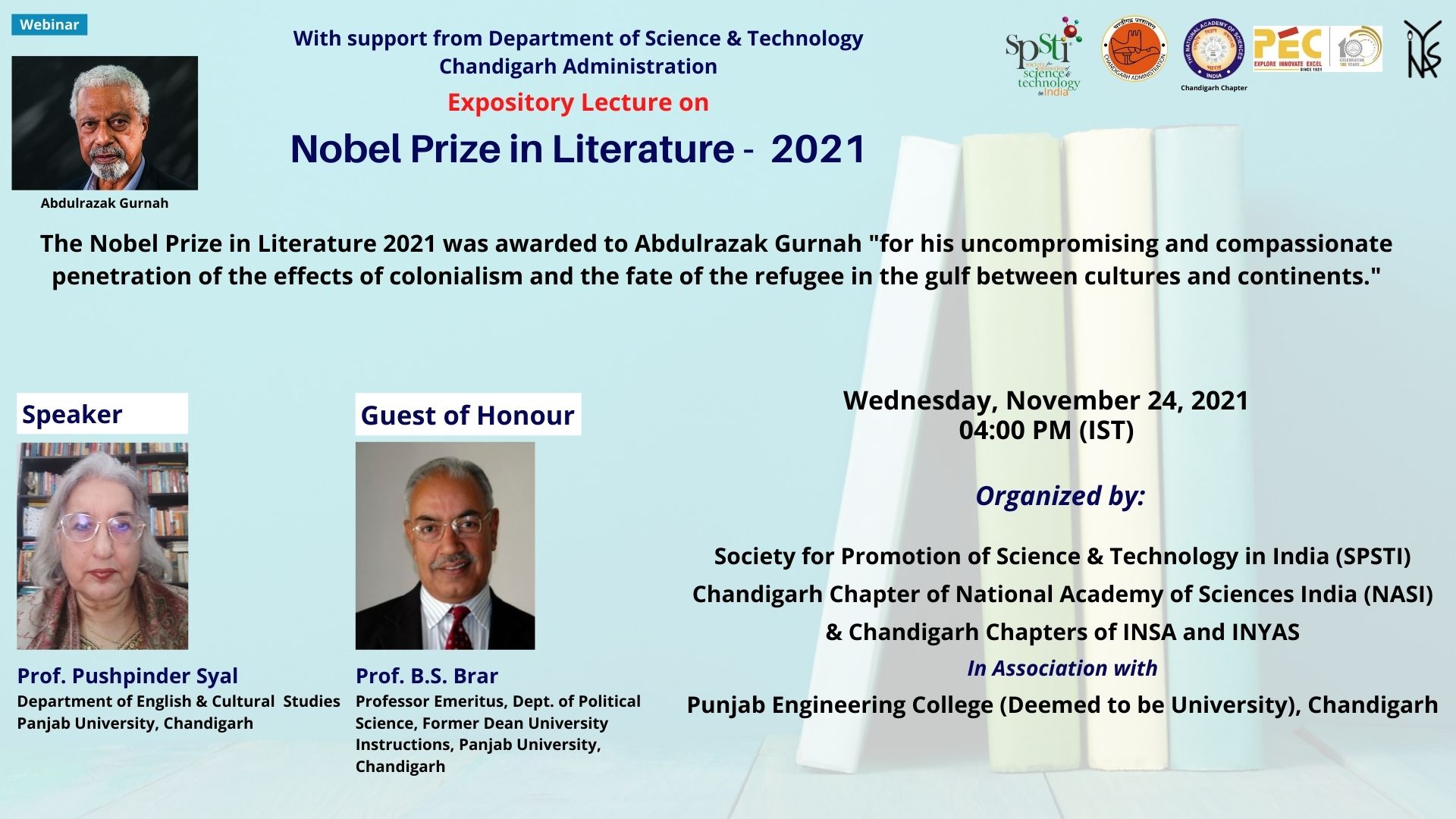Lecture on Nobel Prize in Literature 2021
The Nobel committee recently announced that the Prize in Literature for the year 2021 is to be awarded to Abdulrazak Gurnah. The Society for Promotion of Science & Technology in India (SPSTI) with support from Department of Science and Technology, Chandigarh Administration and in association with Chandigarh Chapters of National Academy of Sciences India, Indian National Science Academy & Indian National Young Academy of Sciences and Punjab Engineering College (Deemed to be University), Chandigarh organized a webinar on the topic on Wednesday, November 24, 2021. at 4.00pm. It was the fourth expository lecture in the series for 2021 and will be concluded on 9th Dec. The days before the prizes are ceremoniously awarded in Stockholm.
Prof. Arun K. Grover, former Vice Chancellor of Panjab University & Vice President of SPSTI steered the session, welcomed all and presented the opening remarks.
Dr. Pradeep Kumar, Member INYAS, IIT Mandi introduced the Guest of Honor, Prof. B.S. Brar, Professor Emeritus, Dept. of Political Science and Former Dean University Instructions, Panjab University, Chandigarh. After his address, Dr. Syed Abbas, Member INYAS, IIT Mandi introduced the speaker Prof. Pushpinder Syal, Dept. of English & Cultural Studies, Panjab University, Chandigarh.
She started lecture with her own journey to South Africa in the form of writings being recommended by the senior professors at Panjab University, Chandigarh and Punjabi University Patiala. She said we are much nearer to Africa than we are to many other parts of the world. And that we in fact, African writing has more importance for us. She talked about how with the work of various writes there was change in the nomenclature from the idea of the colonies as a Commonwealth to the idea of post-coloniality. She shared while she was completing her PhD at Lancaster University, on studying the reworking of myths in English discourse, Wole Soyinka in 1986 won the Nobel Prize and in history of 120 years Gurnah is the only the fifth also from Africa to have received the prize. He has been awarded the Nobel Prize “for his uncompromising and compassionate penetration of the effects of colonialism and the fate of the refugee in the gulf between cultures and continents”. Gunrah challenges the theory of cultural clash. Theory of clash of cultures is the way in which we have the West limited explanation of post colonialism which even non western for post colonial tend to adopt. She draws the closeness of India with Africa through thousands of years of interaction between the two through Arabian Sea and Indian Ocean. She talks about the great scramble for as different countries in Africa at different times by different people. She explains Africa was under control for gold and mines but was also the tussle between the powers. She draws the similarities on how India and Africa have been colonised and later these countries got differentiated by the kinds of powers that conquered them. She further talks about the Germans being exploiting Africa but the first and second world wars and the holocaust drew a curtain over their exploitation. Germany started colonising by their military brute rule, death camps etc. Gunrah has written extensively about it in his book ‘Afterlife’. He talks about Zanzibar as the ancient hub of cultural mixing and the coastal areas that’s what he is really specializing. The coastal areas and the coastal culture all along the seaboard and stretching out towards India and are connected by the monsoons; becoming hubs of cultural mixing, and intermingling among diverse Indian Persian, Arab Bantu cultures, as well as beliefs, stories and materials that seafarers bring back from their travels. She talks about the work of Gurnah who bring forth the atrocities on Africans. She said one can find in the work of Gurnah the issues of colonisation, identity exiled diaspora, migration and displacement, and survival of people in the midst of terrible upheaval. One would find with the clashes of culture there are continuum of languages, cultures and religions. She concluded her talk saying Gurnah writing is more than writing about the need for the notion of race, as defined within certain paradigms of categorization, or the Western habit of reducing diversity to binary of one kind or another.
The lecture was attended by 48 participants on Zoom and many others through live streams of the Society on Facebook. The concluding remarks and vote of thanks was presented by Prof. Arun K. Grover.

